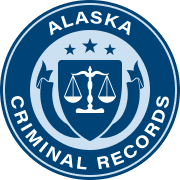Alaska Criminal Records Lookup
The following is for information purposes only
Alaska Criminal Records

Criminal records in Alaska reflect a person's previous and current criminal acts. These rap sheets provide information regarding an individual's arrests, charges, and convictions in the Alaska criminal court system.
Are Alaska Criminal Records public? Alaska is a state with open records. It means anyone can get all their criminal history information if they ask for it. The Alaska Public Records Act ensures the public can access government information and records.
The Alaska Department of Public Safety is in charge of keeping most of the state's criminal records.
The information in a record comes from state and municipal trial courts, law enforcement agencies, and correctional institutions. Specifically, the Alaska Criminal Records may include the following information:
- Full name and probable aliases of a person
- Personal data, such as date of birth, age, sex, race, height, weight, and other physical attributes
- Fingerprints and a mugshot
- Misdemeanor convictions and penalties
- Felony offenses and convictions
- Traffic records
- Previous and active arrest warrants
- Prior arrests
- Pending and dismissed charges

What Are the Different Types of Alaska Criminal Records?

Criminal records in Alaska may vary depending on an individual's violations. Here are the violation records in the state:
Felonies
Alaska considers felonies more severe than misdemeanors. The state classifies felonies as Unclassified, A, B, and C.
- Unclassified felonies are penalized by up to $500,000 and 99 years imprisonment for the most severe offenses. Examples of unclassified felonies include attempted murder, sexual assault, and murder.
- Class A felonies can get you up to 20 years in jail and a fine of $250,000. Examples of Class A felonies include assault in the first degree.
- Class B felonies carry a potential 10-year prison term and a $100,000 fine. Providing marijuana to a minor is an example of a violation in this category.
- Class C felonies carry a maximum of 5-year imprisonment and a maximum fine of $50,000. Promoting prostitution is an example of a crime under this category.
Like in most states, felony records obtained in a courtroom are likely to include information on the accused and the offense but far less about the victims. Most of the time, this record has the following information:
- Details on the individual, including name, residence, age, and place of work
- Contextual information on the charges, such as police statements, evidence, and witness statements
- Whether or not bail was set or paid
- How the defendant pleaded (guilty or not guilty)
- The trial type and judge's name
- The imposed punishment
A felony conviction remains on a person's criminal record for life. In most instances, expungement is the only option to remove it.
Misdemeanors
Misdemeanors are non-indictable offenses that are less serious than felonies in Alaska. They include less severe property crimes and personal assault. In Alaska, misdemeanors are class A or B.
The Class A misdemeanors carry a year in prison and a $10,000 fine, whereas Class B can lead to 90 days in jail and a $2,000 fine. Here are the examples of misdemeanors in Alaska:
- Disorderly conduct
- Driving under the influence
- Theft of items valued at less than $500
- First-degree harassment
- Prostitution
- Fourth-degree assault
What information do misdemeanor records contain in Alaska? When you uncover a person's criminal history, the charges will be clearly and mostly outlined, along with:
- The accused's plea
- An obligation to return to court
- Details such as the sentence, community work, comparable behavior management program, and penalties
- Whether a magistrate or judge made the court decision
In Alaska, removing misdemeanor records from a criminal file is simplest if a person is willing to make an effort. In the absence of a request or petition to seal or expunge the misdemeanor record, it remains accessible to the public permanently.
Criminal Driving Violations
Most of the criminal driving violations present in Alaska driving records are the following:
Reckless Driving
In Alaska, reckless driving is a misdemeanor. A conviction carries a maximum of $1,000 in penalties and a year in prison. Drivers with a ten-year conviction for reckless driving are subject to longer suspensions.
Negligent Driving
Negligent driving is a lower crime than reckless driving in Alaska. It is driving in a way that poses an unreasonable risk of injury to a person or property and endangers a person or property. The conviction will add six points to the driver's driving record and impose a maximum fine of $300.
Driving While Intoxicated / Under the Influence
The majority of Alaska DUIs are misdemeanors. However, the punishments might vary depending on the offender's prior record and the case's specifics. Also, many arrests and incidents involving injury can elevate a DUI accusation to a felony.
What information comes with criminal driving records in Alaska? From most court documents, you will discover:
- Overall driving record of the person
- The specifics of the driving accusation
- Any penalties imposed, including mandatory driver education programs and ignition interlock devices.
- Whether the person fulfilled their punishment effectively
Most of the criminal driving violations in Alaska, such as a DUI conviction, remain on your record permanently. In addition, you will gain a violation point in each type.
Sexual Offenses
Those convicted of sexual offenses are sex offenders. Rape, child molestation, and sexual misconduct are the most prevalent sexual crimes. In Alaska, there are many degrees of what constitutes a sexual crime and the penalty for offenders.
AS 12.63.100 of the Alaska Statutes state that a person is guilty of "Aggravated Sex Offense" if they commit any of the following:
- First-degree sexual assault. It is an unclassified felony, punishable by up to 99 years in prison.
- Second-degree sexual assault. It is a Class B felony with a $100,000 fine and a maximum 99-year sentence.
- Minor first-degree sexual abuse. It is an unclassified felony punishable by up to 99 years in prison, depending on the offender's prior convictions, the victim's age, and the weapon used. In addition, it has a maximum fine of $500,000.
- Minor second sexual abuse. It is a class B felony that can lead to a $100,000 fine and up to 99 years imprisonment, depending on the victim's age, the offender's past convictions, and other comparable circumstances.
The legislation in Alaska mandates the registration of a sexual offender's name, current home, and other pertinent personal data. After registration, this information stays a part of the public record, often for the remainder of the sexual offender's life.

How Do You Expunge Criminal Records in Alaska?

Restricting public access to a person's criminal record is often known as "expungement". Under Alaska law, expungement is distinct from a "pardon". Unfortunately, there is no law in Alaska that expunges criminal history records.
Even after someone has completed probation, it is often impossible to expunge an arrest or charge from the Alaska criminal record. However, in very restricted instances, Alaska only seals adult criminal records.
In Alaska, you may only seal your criminal record if you can show mistaken identification or false accusation. You must accomplish and submit a Request to Seal Criminal Justice Information form to seal your records.
No one can read the information in your sealed criminal record except for:
- Record management (including auditing)
- Criminal justice employment
- Your evaluation
- Statistics or research
- Eliminating an impending threat to a person's safety, or
- Compliance with legislation or court order

What Are Alaska Inmate Records?

Alaska inmate records offer official information about jail or prison inmates, which is part of a person's public criminal records.
The Alaska Department of Corrections (AK DOC) keeps inmate data on people currently or formerly in its custody or supervision. People in the Department of Corrections custody serve a court-ordered prison sentence.
The AK DOC has search tools for prisoners through VINElink. Also, people who want to know where and how an inmate is doing can call VINElink at (800) 247-9763.
What information comes with Alaska inmate records? Inmate records usually contain the following information:
- Identifying information on the inmate, including birthday, sex, and race
- Individual's mugshot
- Information about charges and sentences
- The offender's jail county
- The inmate's date of admission and estimated date of release
- The contact and visitation information for the detainee

What Are Alaska Arrest Records?

A law enforcement officer in Alaska may arrest if someone committed a misdemeanor or felony.
The courts or criminal justice agencies issue warrants of arrest for law enforcement.
In Alaska, a judge or magistrate is in charge of issuing warrants. The Fourth Amendment guarantees that the court must have probable cause before releasing this paper.
Law enforcement officers use warrants to arrest, search, or seize evidence of a crime. It may also bring someone to court who has skipped a hearing. Sometimes warrants are issued to guarantee tax payments.
Following the arrest, the arresting agency begins the booking process, which is when the suspect gets their personal information placed in the administrative computers. Booking is also when the evidence against the suspect gets categorized and tagged.
The arresting agency keeps the arrest record. So if the county Sheriff's Department made the arrest, the requester must go to the Sheriff's Department.
How to obtain arrest records in Alaska? Getting free arrest records is challenging in this state. The arresting agency may levy a fee for document copies. If it benefits the public, an arresting agency may distribute the material. If not, the requester must file a fee waiver.
What information comes with Alaska arrest records? Arrest records in Alaska document a person's arrest history. It shows whether someone has been arrested, questioned, detained, or held for inquiry. Also, it lists the charges and persons involved.

How Do You Find Alaska Criminal Records?

What are the purposes of finding criminal records in Alaska? Officially, they are for background check requests. The Alaska Statute AS 12.62.160 permits "Any Person" to acquire Alaska criminal justice information.
It also permits the release of extra information to employers/licensing authorities for screening candidates for employment involving the care of children and dependent persons (an "Interested Person"). In this statute, the record subject may access or acquire a copy of the document.
The Criminal Records and Identification (R&I) Bureau of the Department of Public Safety manages official Alaska Criminal Justice Information.
There is no official database online where you can search for Alaska criminal records. So, people who want to see criminal records must do so in person or by mail.
You may get Alaska Criminal Justice Information via a name search or by providing the record subject's fingerprints. Currently, a name-based background check costs $20, and a fingerprint-based one costs $35.
All fingerprints must be on a standard FD-258 FBI fingerprint form; otherwise, they will reject it, including those printed on the legal form but in various sizes or on different paper types.
Note for people seeking mail-in name-based background checks: Results may be sent or faxed, but not both unless an additional copy is purchased. To get additional copies, you must request it for $5 with the original report. Other reports asked later cost $20 each.
A walk-in request is usually faster than a request sent by mail, which takes an average of ten (10) business days. But either way may be inconvenient in some situations, especially if the person asking for the record needs it quickly.